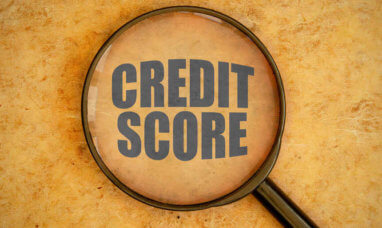Would you like to see your credit score 100 points higher? Imagine what you could do with a credit score like that! You could finally buy that new car or get a mortgage without paying such a high interest rate.
But you won’t get there with your current credit score. So if you’re wondering how to improve a 613 credit score or anything on the low end, check out these nine ways to build your credit and watch your score jump. If you’re looking to build credit fast then follow the tips and tricks of this article.
Can You Expect a 100-Point Jump?
A 100-point jump on your credit score sounds like a dream. But experts agree that a 100-point jump is possible. And typically, the lower your score, the easier it is to bring it up 100 points. Small changes make a big difference and the difference is even bigger when you have a low score.
In other words, yes, with a little determination, a few new habits, and a little time, you can watch your score bounce closer to where you’d like it to be. Of course, it’s going to take some effort.
How to Improve Your Credit Score
Here are nine strategies for giving your credit score the boost you desire.
1. Be Strategic About Paying Credit Card Balances
You should be aware of your credit utilization. This is the amount of credit available to you that you are currently using.
For example, let’s say your combined credit limit (all your credit card limits together) equals $10,000. If you are carrying a $5,000 balance, you are using 50% of your available credit.
Experts recommend keeping your credit utilization under 30%. However, people with the highest credit scores tend to keep their utilization under 7%.
Why is this important? The factors that affect your credit score don’t all affect your score equally. Some are considered more important than others and thus have a bigger impact on your final score.
Credit utilization contributes to about 30% of your credit score—which is quite a sizeable chunk. Lowering your credit utilization rate has a dramatic and immediate impact on your overall score.
But, how do you keep those balances low? The whole reason you have credit cards is to be able to use them.
That’s where you have to be strategic about making payments. You don’t have to stop using your card to keep your balance low, you just have to make a payment right before the credit card company reports to the credit bureaus.
To do this, make your payments before the billing cycle ends so your balance is lower when they make the report. Or make a payment immediately after a big purchase so it doesn’t affect your balance. Alternatively, you can make periodic payments throughout the month to always keep your balance low.
Bottom line: paying your balance before the end of the billing cycle is a fast way to boost your credit score.
2. Request a Higher Credit Limit
Another excellent way to reduce your credit utilization ratio is to have a higher credit limit. With this method, you don’t even have to lower your balances!
For example, let’s say you still owe $5,000 on your credit card. You talk to your credit card providers and manage to get your credit limit raised from $10,000 to $15,0000. Instantly, your credit utilization rate drops from 50% to 33.3%.
It’s so easy and all it takes is a phone call!
Of course, the problem is that you can easily be denied. However, if you have been making positive credit changes or your income has gone up, there’s a good chance you’ll be approved for more credit.
When you call, ask about avoiding a “hard” inquiry on your credit since this can bring your score down a few points for a while.
3. Borrow Someone Else’s Credit as an Authorized User
Did you know that it’s possible to “borrow” someone else’s good credit? All you have to do is become an authorized user on their card. Then, their account will show up on your report and this positive information will factor into your overall score.
Parents often do this for their children when they’re just starting out and need to build credit history. After all, you need a good credit score to qualify for credit, but you need some kind of credit to your name to build a good score.
By becoming an authorized user, you get an instant credit boost as soon as the new account is reported to the credit bureaus.
Bottom line: becoming an authorized user is a good way to dramatically increase your score fast. However, you have to be responsible about it. The other person becomes responsible for your debts if you don’t pay on time and their credit can be negatively affected by your payment habits.
4. Make Timely Payments
The fastest way to tank your score is to make late payments. On-time payments account for the largest chunk of your credit score at 35%. Plus, it takes seven years for late payments to fall off your record.
Don’t worry if you already have a few late payments on your report. Do whatever you have to ensure you make on-time payments from this point forward. With a steady streak of on-time payments, the negative effects of old missed payments diminish until they finally disappear completely.
Also, don’t sweat it too much if you miss the payment by only a couple of days. Creditors typically give you a 30-day grace period to make the payment.
However, if you miss a payment by 30 days or more, call your creditor immediately. Make the payment and politely request that they don’t report this information to the credit bureaus. If missing payments is an irregular occurrence for you, they may agree and the missed payment will never appear on your report.
5. Check Your Credit Report and Dispute Errors
As with everything else, it is possible to have errors in your credit report. Unfortunately, these errors could be pulling down your score.
The good news about this is that you have another recourse to bring your score up. How much it will come up depends on the nature of the error. For example, a recent missed payment reported in error will have a bigger impact than old negative information that hasn’t dropped off yet.
To find out if you have errors on your report, request a copy of your credit report and review it. You have the right to request a copy once a year for free from each of the three major credit-reporting agencies — Experian, TransUnion, and Equifax. Taking advantage of each one, you can get a copy of your report 3 times a year for free.
Carefully review the report, then dispute any errors you can find. This can be a bit of a time commitment as you’ll have to file the dispute and then follow up to see how things are going.
Plus, it can be a lengthy process. The credit bureaus have to investigate your claim and it can take a while. If you’re trying to improve your score before taking out a large loan (such as a mortgage) do this a few months before to give it time to work.
6. Pay Off Collections Accounts
An account in collections will seriously affect your score. If you want to see your score improve, you’re going to have to deal with any account(s) you may have in collections.
Paying it off as soon as possible is the first step (and will get rid of the danger of being sued). From there, politely request that the collection stop reporting the debt. Removing that information from your report will have an even bigger positive impact than just paying it off.
You should also request that information about old or inaccurate collections accounts be removed.
7. Build Credit with a Secured Credit Card
An excellent method for building or rebuilding credit is to create a history of on-time payments. Remember, timely payments account for a whopping 35% of your credit score!
But, what if you can’t get a credit card because of poor credit or no credit history? A secured credit card can be just the thing.
To get one, you pay a deposit, which is usually equal to the card’s credit limit. Lenders are happy to issue these cards since they take on no risk. They are essentially lending you your own money. It seems silly, but this method allows you to prove your credit-worthy status by building a history of on-time payments.
It will take time to see a big impact on your score, but this type of charge card affects your credit score by building both good habits and good credit history.
8. Get Credit for Your Bills
Another method of boosting your score is to get credit for the bills you are already paying on time. This method is particularly effective for people who have no credit history.
Have you been paying for services in your name such as utilities, a cell phone, rent, streaming services, etc. for years? Then you can instantly add a couple years of credit history to your report.
Experian Boost offers this service in a limited capacity. Benefits from this service only affect your score with Experian and you don’t always know from which agency your lender will request your report.
Rent reporting services can also get your payment history added. Make sure you use one that includes a look-back feature, otherwise you’ll only be getting credit from this point forward.
9. Mix It Up
Not all types of credit are considered equal and it is beneficial to your score to have different types appear on your report.
For example, if you only have credit cards, it could benefit you to apply for a personal loan. If your short history or low score is making that problematic, consider a loan-builder product that works similar to a secured credit card.
Regardless, any addition of a new account in good standing will only benefit your score. Furthermore, adding new credit cards will up your credit limit which will lower your credit utilization (as long as you don’t load up your new card).
However, weigh your options carefully. New loans may cost you origination fees or interest. Make sure that the benefit outweighs the cost.
Plus, applying for new types of credit can result in soft or hard inquiries on your credit report which can lower your score. While you can try bumping inquiries off your credit report, too many hard inquiries might affect your score negatively enough to negate the benefits of added credit sources.
Frequently Asked Questions
Can You Get Student Loans off Your Credit Report?
You can’t remove your student loans from your credit report entirely. The only thing you can do is dispute inaccurate information to get it removed.
However, having student loans is a positive thing as long as you are making your payments on time. If you’re having trouble with this, consider refinancing with an extended loan term or take advantage of a federal income-based repayment plan.
My Credit Score Went From 524 to 0. Why?
If you have a credit score of zero, something is wrong with your report. The lowest FICO score is 300 and it is rare for anyone to have a score that low.
If you’re seeing zero, you may be looking at a report that uses a less popular scoring system. Check your FICO score instead, which is what lenders will look at.
Featured Image: Megapixl








